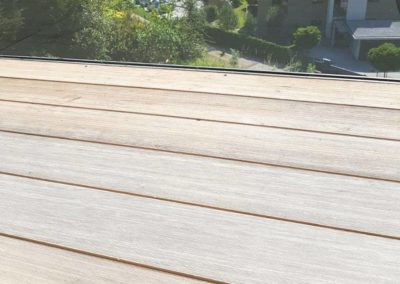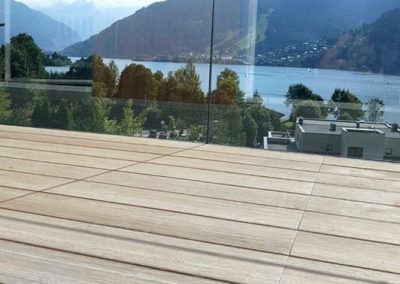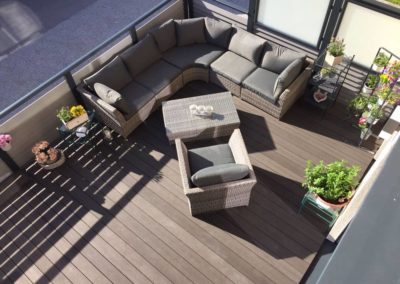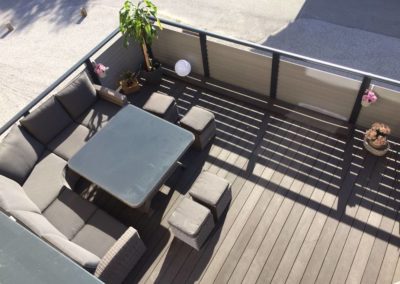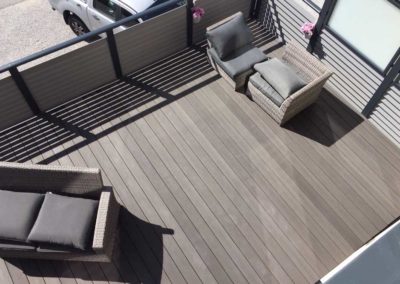WPC terrace
Terrace with WPC planks
In recent years, the trend in the number of Terrace timbers strongly shifted towards WPC wood. But what does WPC actually mean? WPC stands for Wood Plastic Composites and is a thermoplastically processed mixture of wood fibres and plastic granules, which are produced using an extrusion process. The wood content of these boards is usually between 50% and 80%, with the remainder consisting of special plastics for outdoor use. Decking laid with high-quality WPC boards has a service life of up to 30 years!
There are now a large number of different colours and shapes of WPC planks, with the natural and slate-like colours proving the most popular.
The ribbed or smooth surfaces are modelled on the larch surface of natural wood, but recently there have also been heavily brushed WPC woods that reproduce a very realistic wood structure, such as brushed parquet indoors. The latest generation of brushed WPC boards are almost indistinguishable from real wood.
There are different variants and profiles of WPC decking boards, but not all of them are suitable for the alpine, frosty climate in Austria:
Hollow chamber profile with angular chamber design
These WPC planks are the typical DIY store planks, which are very cheap and also lightweight. However, their stability and load-bearing capacity are not very high and it is not advisable to use these boards in exposed outdoor areas. They can collapse too quickly after just a few years under point loads. In most cases, a cheap substructure is also offered, which often breaks before the WPC boards do.
Hollow chamber profile with round chamber design
This WPC profile combines the advantages of the solid plank in terms of stability and the low weight of the hollow chamber plank. These boards are well suited for outdoor areas exposed to the elements and retain their shape very well even after many years.
WPC solid plank
This profile is the most stable of all WPC decking boards and is also very suitable for outdoor areas exposed to heavy weathering. They are heavy and require a stable substructure made of aluminium rods due to their high weight, which must be installed at the correct distance. However, we generally recommend an aluminium substructure for all 3 different variants.
Why WPC planks?
High-quality WPC boards have a durability class 1, which means that they often last for more than 25 years if laid professionally. In comparison, larch wood lasts 10-15 years and Bangkirai 15-20 years.
The surface of the WPC planks is very easy to care for and low-maintenance. In contrast to natural wood, no re-oiling is required! There are now a new generation of WPC boards that have a patented protective shield. This makes the boards scratch-resistant and completely resistant to stains. If a decking board needs to be replaced due to damage, this can be done with virtually no difference in colour to the existing board.
Colour changes are a foreign word to WPC planks! Thanks in particular to the UltraShield surface, greying, as with natural wood, is virtually impossible. This is also a great advantage if a plank does need to be replaced.
The planks are very resistant to salt and chlorinated water, making them ideal for pool surrounds. They are also non-slip and waterproof and resistant to fungi, algae and insects.
Perhaps you are familiar with larch planks when they start to splinter and warp and you can hardly walk on the surface without shoes? This is impossible with WPC planks. They have a very pleasant barefoot feel, but get warmer in the summer when the sun is strong than in summer. Real wood floorboards.
FAQ - Frequently asked questions about WPC decking
What is WPC?
WPC stands for Wood Plastic Composites and is a thermoplastically processed mixture of wood fibres and plastic granules, which are produced using an extrusion process. The wood content of these planks is usually between 50% and 80%, with the remainder consisting of plastics.
Why WPC planks?
High-quality WPC planks are:
- Robust and last a very long time compared to natural wood planks
- Easy to clean and low-maintenance - they are very easy to keep clean.
- permanent colour: colour changes are hardly possible due to the UV protective layer.
- insensitive to salt and chlorinated water. They are therefore well suited as pool surrounds.
- safe: no splinters and slates due to the robust surface
Customer testimonials
.


